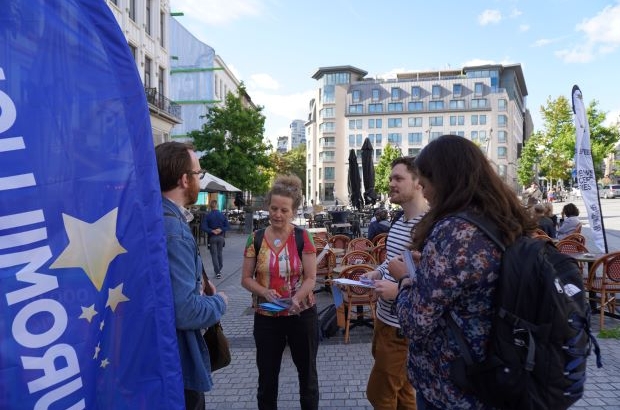- Daily & Weekly newsletters
- Buy & download The Bulletin
- Comment on our articles
Just over 15% of foreign residents are registered to vote in local elections on 13 October
A little over 15% of foreign nationals in Belgium have registered to vote in the municipal elections on 13 October, according to the country’s FPS home affairs office.
This figure includes both EU and non-EU nationals. While EU nationals can register to vote as soon as they arrive in Belgium, non-EU nationals have to wait until they have been resident for five years.
As of 1 August - following the voter registration deadline of 31 July - the FPS recorded 16.27% of registered EU nationals. This represented 135,037 people out of a total of 830,914 potential voters. For non-EU nationals the figures were 27,780 out of a total of 233,592 potential voters, or 11.91%.
The total average of registered voters (EU and non-EU) was 15.29% (162,817 registered out of 1,064,506 eligible voters).
Regional variations
On a regional level, Wallonia boasts the highest number of foreigners registered on electoral lists. Nearly one in four EU nationals (24.6%) have signed up to vote in the region (with the exception of the nine German-speaking municipalities). This represents 55,341 people out of a total of 225,194. For non-Europeans, 18.62% are registered (10,336 out of 55,466).
In East Belgium, the nine German-speaking municipalities recorded a rate of 15.53% of registered voters from the EU and 2.62% for non-Europeans.
In the Brussels Region, 17.09% of Europeans registered (41,251 people), along with13.25% of non-Europeans (9,192 registered out of 69,687 potential voters).
In Flanders, there were 10.4% of registered European voters (36,562 people) and 7.6% of non-European voters (8,221).
Campaigners in Brussels
In the Belgian capital, local campaign groups joined forces to increase voter registration ahead of the 31 July deadline.
With internationals making up one third of the cosmopolitan city’s population, the overriding goal was to give them political representation and ensure public authorities reflected the various communities in their municipality.
Among the non-political and nonprofit groups benefitting from Brussels-Capital region subsidies were Restless.brussels, VoteBrussels and Stand Up For Europe. They staged a series of community events and outreach actions in neighbourhoods with the help of volunteers.
Joining them was the Brussels.commissioners’ office that runs the Expat Welcome Desk. In reaction to the new official figures on voter registration, it published the following information:
- The total number of non-Belgian people who signed up in the Brussels Region exceeds 50,000 for the first time.
- The sign-up rate for EU nationals increased from 16.75% in 2018 to 17.09% in 2024.
- 5 municipalities are above a rate of 20% for EU nationals (Watermael-Boitsfort, Saint-Gilles, Woluwe Saint-Pierre, Forest, Saint-Josse).
- The registration rate for non-EU nationals fell from 19.27% in 2018 to 13.25% in 2024.
- The combined rate decreased slightly from 17% to 16.2%.
- International Brusselers now make up 7.7% of registered voters, and more than one in ten in four municipalities (Saint-Gilles, Ixelles, Saint-Josse and Etterbeek).
- In 2018, non-EU nationals had a much higher sign-up rate than EU nationals, but by 2024 the situation had completely reversed.
“These figures are a great success for the public outreach campaign, given that the overall registration rate was only 12% in May. I'm pleased to see that thousands of International Brusselers have signed up in just a few months,” commented Alain Hutchinson, Brussels Commissioner for Europe and International Organisations.
While reflecting on campaigners’ success and the positive outcome in municipalities that launched initiatives, he proffered a note of caution about the dip in the overall registration rate and “significant drop” among non-EU nationals.
“With a growing and increasingly cosmopolitan population, the Brussels Region and its municipalities need to look at these results and draw the appropriate conclusions,” said Hutchinson.
“The electoral participation of non-Belgians is no longer a secondary issue, but a fundamental challenge for our local democracy. We need a clear framework, a long-term strategy and budgets that match our ambitions.”
Photo: Voter registration campaign in Brussels ©restless.brussels




















Comments
Does that really come as a surprise?
The deadline was far too early and there was too much bureaucracy.
Why do Europeans who are registered here with their municipality and regularly receive tax assessment notices also have to register?
Why doesn't that happen automatically?
The tax assessment notice also comes automatically and nobody has to apply for it.